Have you ever wondered how some websites consistently dominate search engine results and attract a flood of organic traffic? The secret behind their success is often search engine optimization (SEO), and for WordPress users, the best SEO plugins are a game-changer.
For WordPress, SEO plugins offer powerful ways to optimize your website and content for search engines.
In this guide, I’ll draw on my years of experience in creating SEO-friendly content to explain what WordPress SEO plugins are and reveal the top contenders for your business.
Best WordPress SEO Plugins:
Our Top 3 WordPress SEO Plugin Picks
If you’re in a hurry, here’s a comparison of my top 3 choices for the best WordPress SEO plugins:
| Plugin | Description | Key Features |
|---|---|---|
| 🥇 AIOSEO | The most user-friendly and comprehensive WordPress SEO plugin. | ✔️ On-page SEO analysis and checklist ✔️ Schema markup and XML sitemaps ✔️ Social media integration (Open Graph) ✔️ WooCommerce SEO tools ✔️ User role management for SEO access |
| 🥈 SEMRush | Best SEO tool for marketers, bloggers, and business websites. | ✔️ Keyword research and competitor analysis ✔️ SEO Writing Assistant ✔️ Position tracking for keyword rankings ✔️ Comprehensive SEO toolkit |
| 🥉 Google Search Console | Free SEO tool from Google to monitor website visibility in search results. | ✔️ Crawl error reporting and guidance ✔️ Keyword ranking data (position, impressions, etc.) ✔️ Ability to identify new content opportunities |
How I Tested the Best SEO Plugins for WordPress
- I use them in my projects: I use several of these tools regularly on my own websites.
- I test the popular choices: I tested some of the most popular SEO plugins to see if they’re worth it. I analyzed them based on ease of use, functionality, customization options, pre-made designs, and pricing.
- Iexplain who they’re for: I analyzed each plugin’s features to help you decide if it’s the right choice for your WordPress website.
Top SEO Plugins for WordPress 2025
Let’s check out our contenders for the title of best WordPress SEO plugin. I’ve put each tool through its paces in an effort to help you find the right choice for your business.
1. All in One SEO for WordPress
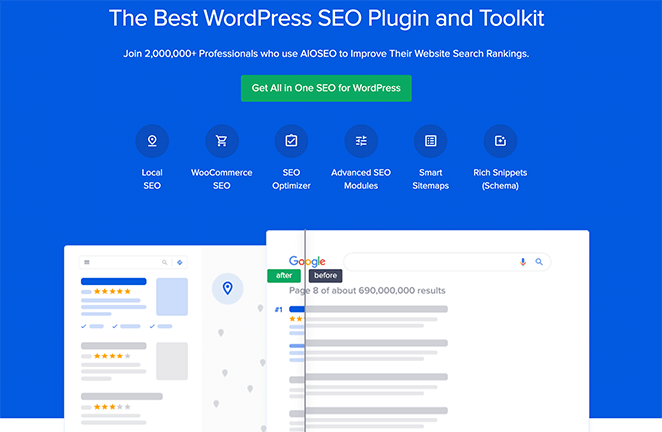
All in One SEO Pack for WordPress (AIOSEO) is one of the best SEO plugins on the market. With over 2 million users, it’s the most user-friendly SEO toolkit that allows you to improve your search rankings without configuring any complicated settings.
After installing the plugin, I found the getting started wizard makes it easy to choose the best SEO settings for your business type. And its TruSEO on-page analysis shows a handy checklist for optimizing your posts and pages.
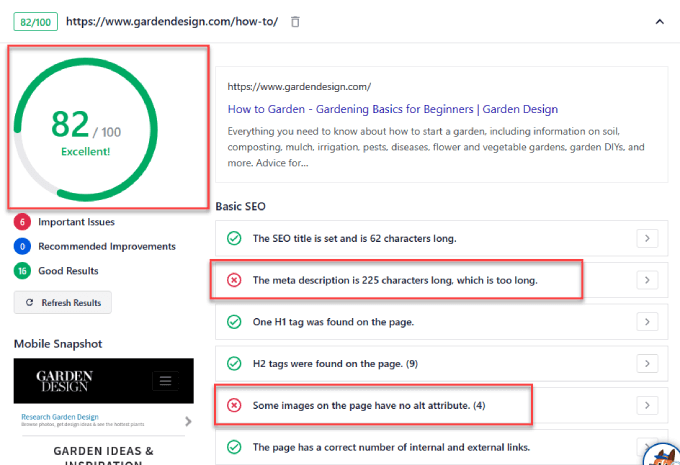
I particularly liked the meta tag generator. With this, you can automatically create SEO title and meta descriptions that use dynamic values like:
- Current year
- Month
- Day
- Custom fields
- Author info
This means you don’t need to update a post to change the SEO title.
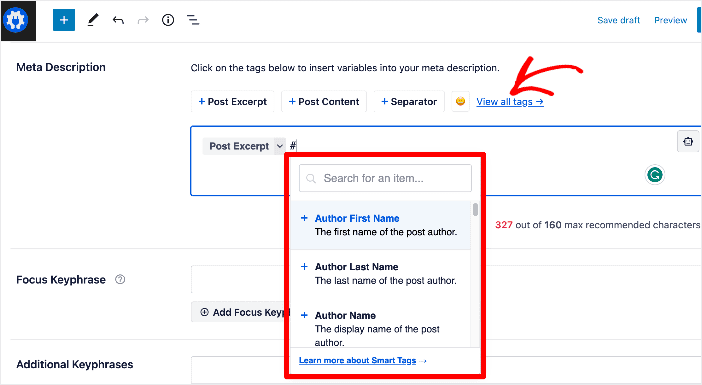
Plus, the All in One SEO plugin integrates with Semrush, so you can easily discover and rank for additional keywords that you might not have known about.
AIOSEO also has rich snippet schema markup, XML sitemaps with advanced controls, SEO health checks, and other helpful features to improve your search engine visibility.
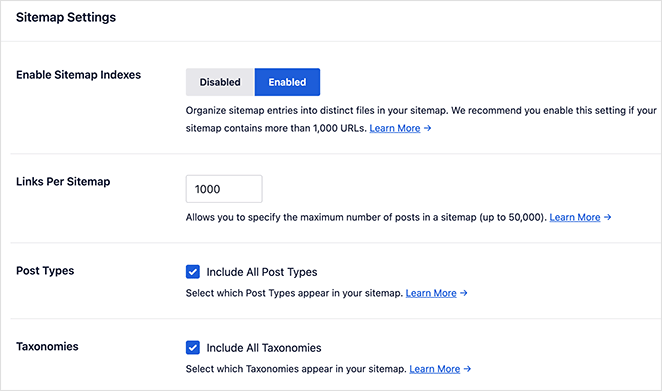
For social media, it can add Open Graph metadata. This allows you to choose the thumbnails that show when your posts are shared on social channels like Facebook, Twitter, and Pinterest. You can also preview how they look.
eCommerce websites can also take advantage of AIOSEO’s WooCommerce SEO tools. This allows you to perform:
- Individual product page optimization
- Product image SEO
- Dynamic optimization
- And more
If you’re more familiar with SEO, you can use AIOSEO’s advanced features to control your RSS feeds, Google News sitemaps, Video SEO, breadcrumbs, redirect manager, internal linking suggestions, Local SEO, and much more.
Plus, business owners can configure the SEO options for user roles. This means you can manage access to vital SEO features without giving every user complete control of your website.
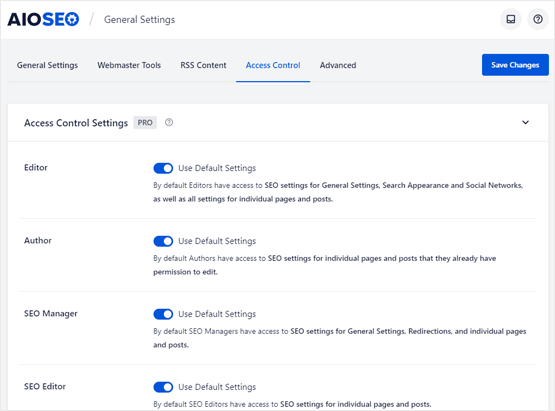
Pros:
- Comprehensive SEO features (title/meta tags, XML sitemaps, rich snippets, etc.)
- User-friendly interface even for beginners
- TruSEO on-page analysis and optimization suggestions
Cons:
- The free version of AIOSEO is powerful, but to unlock the full suite of features, you’ll need one of the paid plans.
Why I recommend AIOSEO: All in One SEO is the most user-friendly and comprehensive WordPress SEO plugin available. It’s an excellent choice for all types of websites and removes the need to install multiple WordPress plugins.
Check out my All in One SEO review for further details.
2. SEMRush

SEMRush is the best SEO tool for marketers, bloggers, and business websites of any size. It offers a comprehensive toolkit to increase your website traffic and grow your business easily.
You can use SEMRush to find search terms and organic keyword opportunities that your website can rank for. It also allows you to research your competitors to see which terms they rank for and how you can improve your content to beat them.
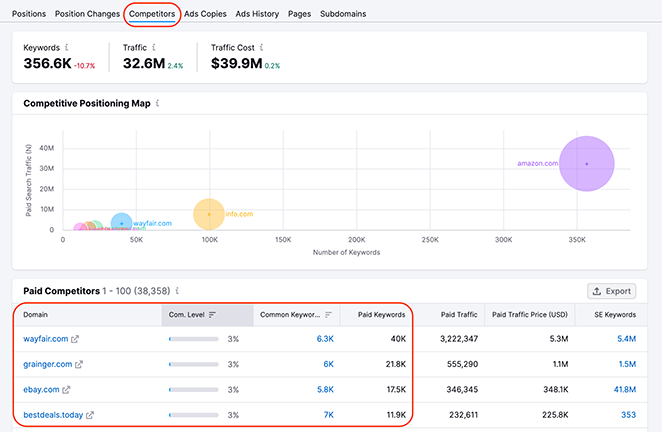
A feature I love and use regularly is its built-in SEO Writing Assistant. With this, you can compare your blog posts and pages to the top 10 sites ranking for your chosen keyword.
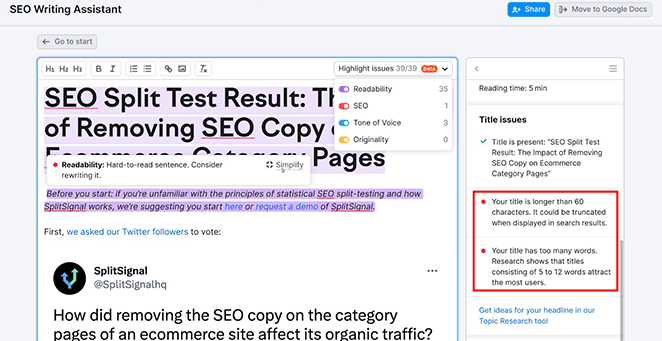
It then offers suggestions like:
- Relevant words and phrases to include
- How many links to include
- The readability of your content
- The tone of voice score
There’s even the ability to create SEO templates and get suggestions for your content. As a result, you can craft compelling, SEO-friendly content to compete with the top search results.
You can also use SEMRush’s position tracking feature to monitor your website’s daily rankings for a set of keywords. It has tons of features like tagging, sorting, filtering, and exporting reports that make it easy for you to find exactly what you’re looking for in your website’s SEO.
Pros:
- Powerful keyword research and competitor analysis
- In-depth site audits
- Content marketing tools
Cons:
- Expensive, primarily aimed at professionals
- Steep learning curve
- Can be overkill for small websites
Why I recommend SEMRush: SEMRush is a great SEO tool for learning what your target audience is looking for in search engines. It’s also helpful for learning what your competitors are up to. However, it can take some time to get to grips with all of its features.
3. Google Search Console
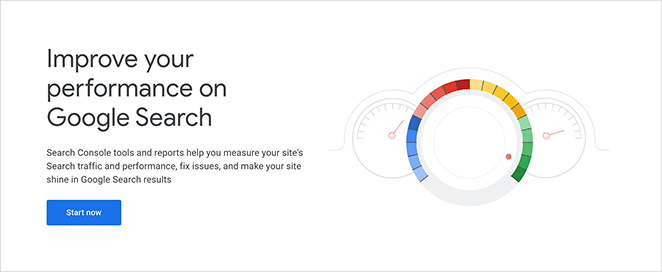
Goole Search Console (GSC) is a free SEO tool from Google that allows website owners to monitor their website’s visibility in Google search results. I use it on my own website to understand how Google sees it, and areas I can improve.
Search Console tells you when Google cannot crawl and index your web pages. And it offers tips and guidance to fix crawl errors yourself.
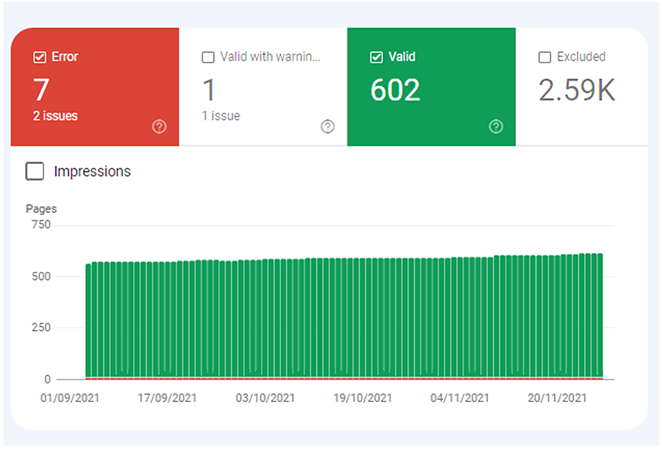
More importantly, Google Search Console displays the keywords that your website is currently ranking for, along with their average position, impressions, anchor text, and more.
By analyzing this data, you can identify keywords you need to focus on to improve your website’s search engine rankings. Additionally, you can use this information to come up with relevant ideas for new blog posts that can help improve your website’s visibility and attract more visitors.
Pros:
- Free and authoritative data directly from Google
- Tracks search performance, clicks, impressions
- Identifies indexing issues and technical errors
Cons:
- Not a full-fledged SEO optimization tool
- Data can have delays
- Interface can be somewhat complex
Why I recommend it: I use Google Search Console because it shows how well my website performs on Google, helping me improve my site’s search engine ranking. It also warns me about any problems like errors or security issues, so I can fix them quickly.
4. Yoast SEO

Yoast SEO is another top WordPress SEO plugin that lets you optimize your WordPress website for search engines.
This plugin allows you to easily add SEO descriptions and titles to your website’s posts and pages. And it even lets you add Open Graph information and social media images to your WordPress content.
With the Yoast SEO plugin, you can automatically generate XML sitemaps to make it easier for search engines to crawl your content and set up canonical URLs. You can also import SEO data from other SEO plugins you’ve used previously.
Pros:
- Popular and well-established
- SEO analysis
- On-page optimization guidance
- Readability analysis
Cons:
- Interface can feel a bit dated
- Some features overlap with other WordPress plugins
- Free version’s capabilities becoming more limited
Why I recommend Yoast: I think Yoast SEO is a solid SEO tool for WordPress sites. It helps make your site search-friendly and improves your content with easy-to-follow suggestions. However, I found it wasn’t as easy to use as AIOSEO.
5. Google Keyword Planner

Google Keyword Planner is an SEO tool that helps you generate keyword ideas from Google’s own search data. Considering no-one has more insight into what people are searching for than Google, it’s an excellent tool to consider.
This tool is available to Google’s Advertisers for free, and anyone can use it. The primary function is to show advertisers the different keywords they can bid on for their Google Advertisement campaigns.
That said, it also helps them choose the right keywords for their ads by showing search volume estimates, total results, and ranking difficulty.
Even if you’re not an advertiser, you can use Google’s Keyword Planner to find keywords with high search volumes, interest, and the potential to outrank your competitors.
Pros:
- Free to use
- Keyword data directly from Google
- Search volume estimates and trends
Cons:
- Requires a Google Ads account
- Competition data can be limited
- Primarily focused on paid search
Why I recommend Google Keyword Planner: I find Google Keyword Planner to be an essential tool for keyword research. It helps you discover the right keywords to target, showing search volumes and competition levels. This tool is key for planning SEO and advertising strategies, making it easier to reach your audience.
6. Ahrefs

Ahrefs is a popular SEO tool for bloggers, businesses, and marketers. It’s a viable alternative to SEMRush and offers many similar features and functionality.
With Ahrefs, you can carry out:
- Keyword research
- Competitor analysis
- Backlink research
- Monitor keywords rankings
- And more
It also has a comprehensive content analysis tool to improve your website content while targeting specific keywords.
Despite the overlap of features, Ahrefs particularly excels at backlink analysis. For example, you can see which websites are linking to your competitors and not you. As a result, you can focus on building partnerships with those sites to get more backlinks.
You can also use Ahrefs to see content that your competitors rank for, and you don’t. With that information, you can create content on those topics to increase your exposure.
Even better, Ahrefs can help you find duplicate content and cannibalization on your website so you can merge and upgrade content to boost your search rankings.
Pros:
- Extremely powerful backlink analysis
- Detailed competitor research
- Excellent suite of SEO tools
Cons:
- Very expensive
- Overkill for most casual website owners
- Data can be overwhelming for beginners
Why I recommend Ahrefs: I consider Ahrefs a comparable tool to SEMRush. It offers deep insights into backlinks, keyword rankings, and competitor analysis, helping you understand your site’s performance and find opportunities for improvement.
7. MonsterInsights

MonsterInsights is the best Google Analytics plugin for WordPress. It makes it easy to install Google Analytics in WordPress and show easy-to-understand reports right inside your WordPress dashboard.
This WordPress SEO plugin provides valuable insights into your website traffic, user behavior, and top-performing content, helping you refine your SEO strategy. You can also monitor your eCommerce SEO by looking at your most popular products and seeing where you lose customers.
Considering most beginners rely on their best guesses for making marketing decisions, MonsterInsights removes the guesswork by showing the insights you need to improve your site’s SEO strategy.
Pros:
- Easy setup and integration with Google Analytics
- Real-time dashboard within WordPress
- Tracks user behavior on your site
Cons:
- Full features require paid version
- Focuses more on analytics than pure SEO
Why I recommend MonsterInsights: I see MonsterInsights as a crucial plugin for my WordPress website. It simplifies Google Analytics integration, making it easy to track website traffic and user behavior directly from my WordPress dashboard. This tool is essential for making data-driven decisions to enhance my website’s performance and user experience.
8. SEOPress

SEOPress is a popular WordPress SEO plugin that’s both simple and powerful. It has all the features you need from an SEO plugin, such as:
- Meta titles
- Meta descriptions
- Open Graph support
- Image and content XML sitemaps
- Redirection
- And more
This plugin is easy for beginners to set up and has advanced controls for more experienced WordPress users. As such, it’s comparable to other top SEO plugins when it comes to features and settings.
You’ll also find that SEOPress’s paid version is a lot cheaper than other premium WordPress SEO plugins on the market. Just remember, you only need 1 SEO plugin on your WordPress site.
Pros:
- Lightweight and fast
- Clean interface
- Good balance of features vs. simplicity
Cons:
- Lacks some advanced features of larger rivals
- Smaller community support base
- Paid version for full functionality
Why I recommend SEOPress: I find SEOPress really helpful for making sites search-friendly. It’s easy to use for setting up sitemaps, adding SEO titles and descriptions, and managing redirects. SEOPress works great for both beginners and experts, helping websites rank better on search engines.
9. WP Rocket

Your site speed is another critical factor for search engine rankings. If your website is slow, chances are you won’t rank as well as your competitors. As such, you should monitor your website speed and performance to ensure it’s not negatively affecting your SEO.
The easiest way to improve your website speed is to install a caching plugin. WP Rocket is the best WordPress caching plugin on the market. It lets you cache your website to boost its performance instantly.
WP Rocket has powerful features, including:
- Gzip compression
- Page caching
- Cache pre-loading
- And more
It also allows you to lazy load images, use CDN for WordPress, and DNS pre-fetching to improve page load times further.
Pros:
- Effective caching and speed optimization features
- User-friendly configuration
- Integrates with CDNs
Cons:
- Paid plugin
- Requires some basic technical understanding
- Other free caching plugins exist
Why I recommend WP Rocket: I think WP Rocket is a game-changer for speeding up WordPress sites. It’s super easy to set up and instantly improves website loading times by caching, compressing files, and optimizing images. This plugin is key for a better user experience and SEO, as fast-loading sites rank higher on search engines.
8. Rank Math
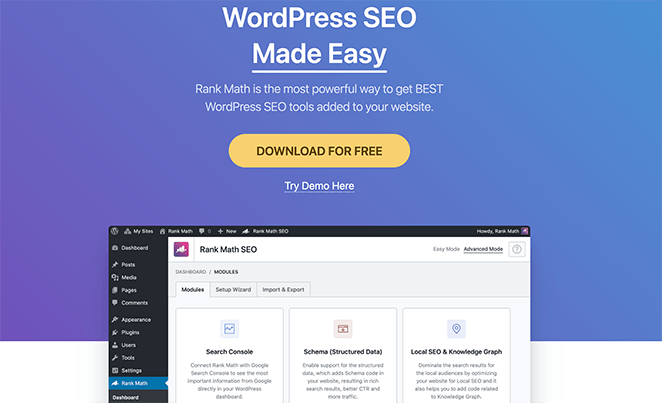
Rank Math is a user-friendly and popular WordPress SEO plugin that allows you to optimize your website for search engines and social media networks. It comes with a beginner-friendly setup wizard to import data from other SEO plugins during the setup process.
With this plugin, you can add meta titles, descriptions, and Open Graph metadata to your blog posts. It also allows you to generate XML sitemaps and connect your website to Google Seach Console.
Additionally, you can add Custom Schema to your site using JSON+LD or HTML. You can even control who can access the plugin features based on user role.
Pros:
- Packed with features, even in the free version
- Modular approach – activate only what you need
- Built-in schema support
Cons:
- Some advanced features require technical knowledge
- Interface can be busy for beginners
- Potential for conflicts with other plugins
Why I recommend Rank Math: I find Rank Math effective for SEO on WordPress. It automates many SEO tasks, like optimizing content with targeted keywords and generating sitemaps, making your work much easier.
9. Schema Pro

Schema Pro is a WordPress plugin that allows you to add rich snippets to your website so it stands out in search results. They do this by showing star ratings below reviews, prices under products, images next to descriptions, and more right inside the search results.
Many of the best WordPress SEO plugins, like All in One SEO, already add structured, rich snippet data to your website. Yet, if you need more schema types or want to extend your current SEO plugin’s functionality, Schema Pro is an excellent choice.
Schema Pro is perfectly safe to use with your existing WordPress SEO plugin. This is because it maps the plugin data to Schema Pro fields.
Pros:
- Easy schema markup implementation
- Supports various schema types
- Time-saver for structured data
Cons:
- Paid plugin
- Some features overlap with SEO plugins like Yoast/Rank Math
- Requires some understanding of schema
Why I recommend Schema Pro: I like Schema Pro because it makes it easy to help search engines understand your website better. Adding specific information that search engines look for helps your site show up more prominently in search results.
10. KeywordTool.io
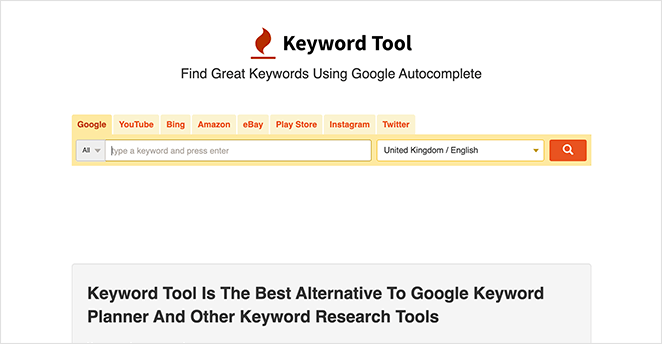
Another powerful SEO tool for your website is KewordTool.io. It’s one of the best free keyword research tools on the market.
With KeywordTool.io, you can quickly generate keyword ideas by entering a search term or phrase. Then it shows keyword suggestions gathered from Google’s autosuggest feature.
You’ll also see keyword suggestions from Bing, Amazon, YouTube, and more, providing a treasure trove of valuable information. And if you upgrade to their paid plan, you can see search volumes, cost-per-click, and more data for each keyword.
Pros:
- Generates long-tail keyword variations
- Data from Google, YouTube, Amazon, etc.
- Free version has basic functionality
Cons:
- Search volume and competition data limited without paid plan
- Primarily focuses on idea generation, not in-depth analysis
Why I recommend KeywordTool.io: I like KeywordTool.io for its ability to generate a wide range of keyword suggestions quickly. It’s great for uncovering long-tail keywords your audience is searching for, helping you create more targeted content without needing access to Google Keyword Planner.
11. Redirection

Redirection is a helpful WordPress plugin that lets you set up SEO-friendly redirects on your website. This means you can easily fix 404 errors and keep track of 301 redirections in WordPress.
Broken website links can negatively affect your SEO rankings and provide a poor user experience. So if you’ve had your website for some time, you should check it for broken links and fix them as soon as possible.
Fixing your broken links is relatively straightforward. Once you find one, you can redirect it to the right piece of content or remove the broken link.
Pros:
- Free and highly effective redirection manager
- Handles complex redirects
- Tracks 404 errors
Cons:
- Interface is no-frills and utilitarian
- Requires some understanding of redirect types
- No automated SEO-focused redirection features
Why I recommend Redirection: I love how Redirection can easily fix or change website links in WordPress. It helps you avoid broken links and makes it simple to redirect users to the right page, which is great for keeping your site running smoothly and your visitors happy.
12. Answer the Public

Answer the Public is a free SEO tool that helps you create optimized content for your website. Just enter a keyword, and it will show you related words and phrases that people use when searching for that topic in search engines like Google, Bing, and Yahoo.
You can use these search terms as latent semantic indexing (LSI) keywords in your website content. This ensures your website shows in search results where it should and attracts people who are genuinely interested in what your site offers.
Pros:
- Visualizes questions people ask around keywords
- Great for content ideation
- Free version with search limits
Cons:
- Limited data refinement capabilities
- Not a replacement for comprehensive keyword analysis tools
Why I recommend Answer the Public: I find Answer the Public helpful in identifying people’s questions about topics so that you can write content that answers these questions directly. However, its free version is quite limited.
13. SEOquake
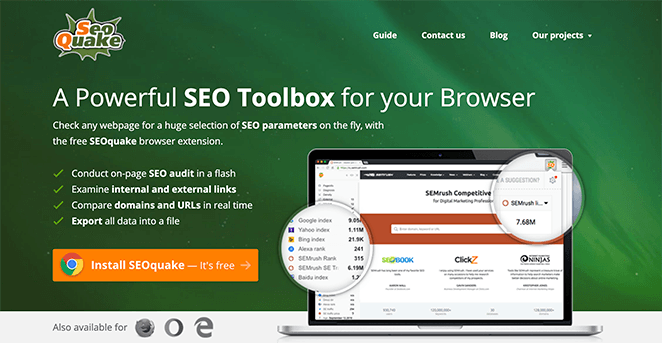
SEOquake is an excellent SEO tool for many website owners. It comes as a web browser add-on for Google Chrome, Mozilla Firefox, Safari, Opera, and other browsers.
This tool provides SEO information for any website, including:
- Page age
- Web page health
- Date of the last update
- Alexa rank
- And more.
It’s also one of the most downloaded browser addons for SEO professionals.
The SEOquake toolbar also shows the same data and search results when typing a keyword. You can use this information to see the competition for different keywords and even download your search results as a CSV file.
Why I recommend SEOquake: I use SEOquake for quick SEO audits of my web pages. It’s a browser extension that shows me key SEO metrics, like page rank and backlinks, right in our browser. This makes it easy to spot improvements for my site’s SEO on the go.
Pros:
- Free browser extension
- Quick SEO audits on any webpage
- Shows backlinks, social metrics, etc.
Cons:
- Data depth limited compared to dedicated tools
- More of a quick diagnostic tool than an in-depth platform
14. Google PageSpeed Insights
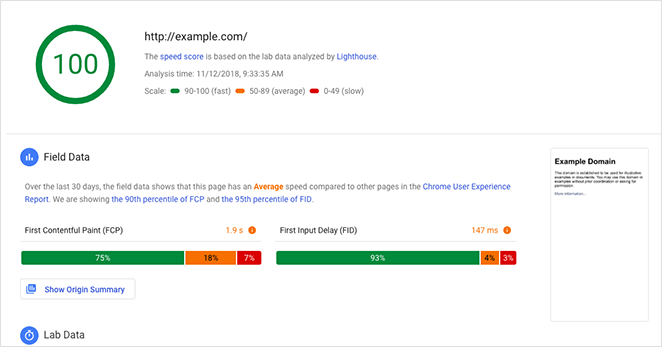
As mentioned earlier, your site loading times play a role in how well it ranks in search results. Slow website loading times impact user experience and can increase your website’s bounce rate.
With Google’s PageSpeed Insights tool, you can see how fast your web pages load. If the online tool detects any issues with your speed or performance, it suggests steps for fixing them.
Google PageSpeed Insights works seamlessly with the MonsterInsights Google Analytics plugin. This means you can check your page speeds right inside your WordPress dashboard, removing the need to access multiple tools outside your website.
Pros:
- Free to use
- Analyzes website speed on desktop and mobile
- Provides specific optimization recommendations
- Data is directly from Google
Cons:
- Scores can fluctuate based on testing conditions
- Recommendations can be technically complex to implement
- Focuses purely on speed, not overall SEO
Why I recommend Google PagsSpeed Insights: I turn to Google PageSpeed Insights to check how fast my website loads. It gives me a score and suggestions on how to make my site faster, which is key for keeping visitors happy and improving my site’s rank on search engines.
15. Broken Link Checker
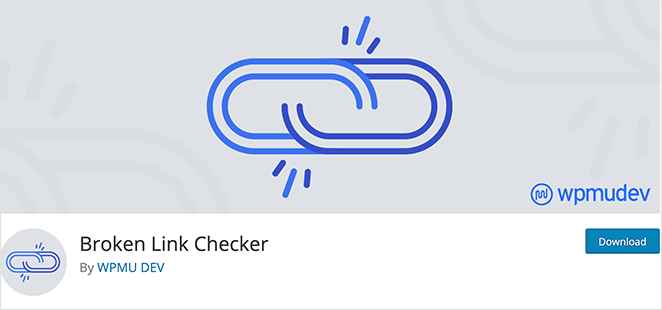
My final solution is Broken Link Checker. This free WordPress SEO plugin monitors your website for broken links and helps you fix them easily.
You may not have the time to manually check your content for link issues, so a plugin like this is super-useful. It automatically checks your archive of published WordPress content, notifying you about broken links and images.
Pros:
- Free plugin
- Scans all content for broken links (internal & external)
- Easy to monitor and fix errors
Cons:
- Can be resource-intensive on large sites
- Doesn’t offer link fixing suggestions, only identifies issues
- Some false positives may occur
Why I recommend Broken Link Checker: Broken Link Checker offers an easy way to find and fix dead links on your WordPress site. It helps keep your site clean and user-friendly by automatically identifying broken links and missing images.
WordPress SEO Tips: Frequently Asked Questions
In contrast, an SEO tool provides you with alerts and data about your site’s overall health. As such, they can help you find opportunities to improve your SEO and weaknesses that prevent you from ranking.
My answer is no. You should only install 1 SEO plugin on your website. Using multiple SEO plugins can cause plugin conflicts, usability issues, and impact your site’s performance.
However, you can use SEO tools to monitor your optimization efforts. For example, you can install the All in One SEO WordPress plugin to improve your content and use SEMRush to look for ranking opportunities
Which Are The Best WordPress SEO Plugins?
After looking at the SEO plugins and tools listed above, you probably want to know which is the best. After testing and reviewing the tools on this list, it’s my expert opinion that:
- All in One SEO is the best WordPress SEO plugin
- SEMRush is the best WordPress SEO tool
With this plugin and tool, you can create a complete SEO framework for your website, carry out crucial on-page SEO tasks, and monitor your SEO performance in real-time.
I hope this article helped you find the best WordPress SEO plugins and tools for your small business website or blog.
You might also like to see our following guides to grow your website:
- How to redesign a website without losing SEO
- Best WordPress landing page plugins
- 17 Expert Landing Page Optimization Tips
Thanks for reading! We’d love to hear your thoughts, so please feel free to leave a comment with any questions and feedback.
You can also follow us on YouTube, X (formerly Twitter), and Facebook for more helpful content to grow your business.





